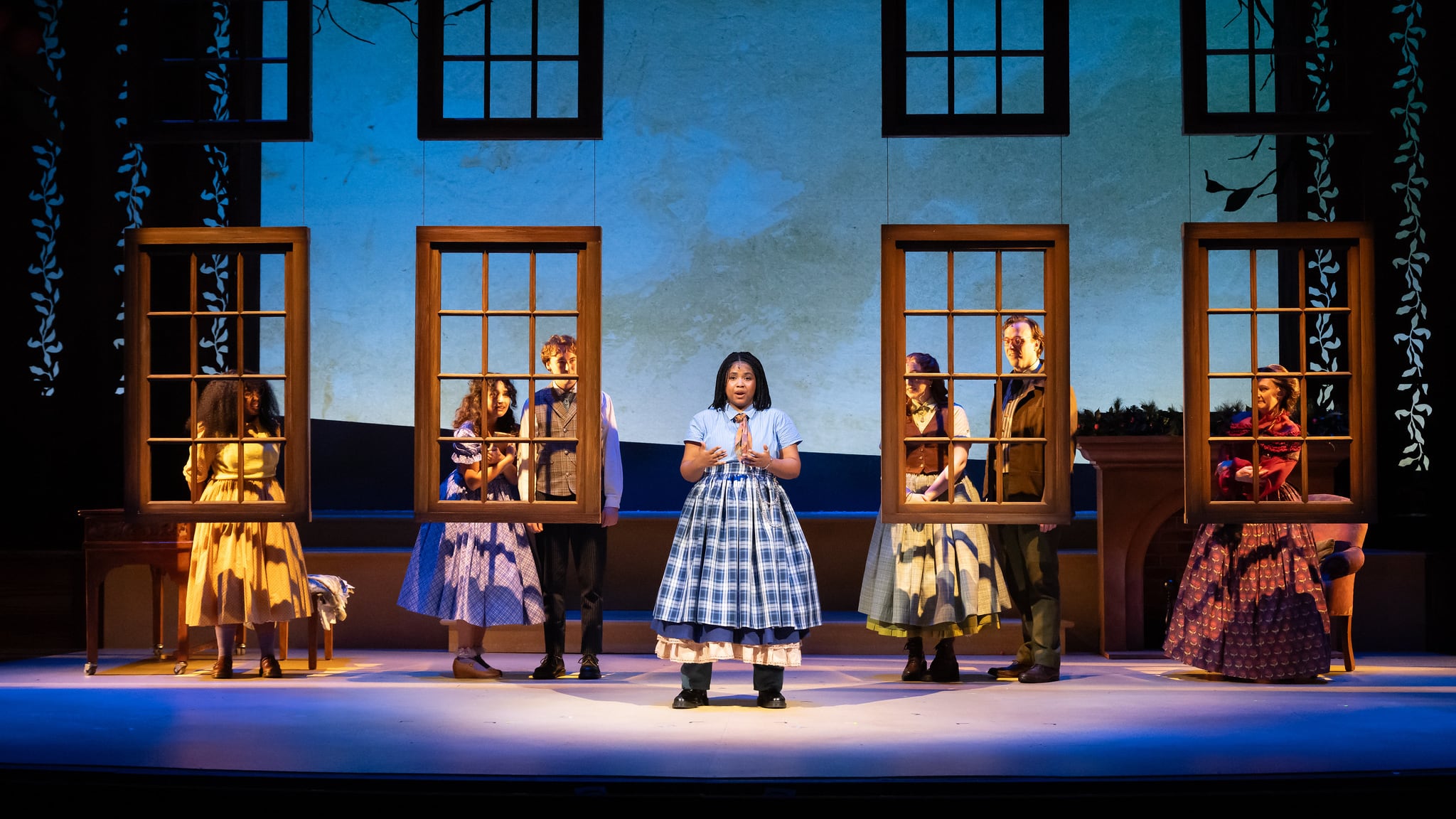If you’ve seen any screen version of Little Women (or have read the book), you know the highlights: Four sisters come of age in Civil War-era Massachusetts, have relatable girl problems, learn valuable life lessons, and experience various shades of loss.
Portland Center Stage’s Little Women by Lauren Gunderson and co-produced by Cincinnati Playhouse in the Park—running through Dec. 21—knows the iconic points you need to hit with any story featuring the March sisters. At a breakneck pace, transitioning quickly via rolling set pieces and lively music, Jo has a wartime Christmas, meets the boy next door, and breaks his heart, cuts and sells her hair (“your one beauty,” Amy says), writes stories and eventually goes out on her own, all while her sisters have concurrent adventures both with Jo and on their own.
In this adaptation, due to the pointed emphasis on Jo’s lines about how adamantly she wants to be a boy and Cincinnati actor Beasley’s brash, confident portrayal of her, one wonders what Jo’s story would be if she were allowed to be who she is instead of a “little woman.” Two of the most recent and famous Jos from film, Winona Ryder and Saoirse Ronan, played Jo as strong yet feminine, a “tomboy” who transforms into a woman over the course of the story. Beasley’s Jo, when she does meet her match, seems less twitterpated and more intellectually attracted to him. Their Jo maintains her sense of self.
Beasley plays double duty, also appearing throughout the play as Little Women author Louisa May Alcott, who famously never married and wanted her autobiographical protagonist to do the same but, after publisher pressure, married off her Jo in a later book. Her private writing reveals that like Jo, Alcott wanted to be a man. Rounding out the cast are the rest of the Marches and the men who love them. Everyone also plays their real-life counterpart, and the device works to differentiate this version of the well-trodden material.
Other meta elements throughout the play include the characters often speaking in the third person, narrating the story as they act it out. They do this without dropping character, which would break up the flow, and the device becomes less noticeable over the course of the play.
Anachronisms sneak into the performance in the modern ways the actors relate to each other—a secret handshake, a “booya”-like reaction, and with some of the line deliveries. Jo wears a jean jacket and some of the transitional music isn’t period. The bows are set to Feist’s “I Feel It All,” which does describe the ardent characters.
The gorgeous set designed by Chelsea M. Warren encloses the stage in branches and uses warm, dark wood accents. The windows that fly in and out match the layout of Alcott’s childhood home and the setting for Little Women, Orchard House. Clever staging using these set pieces—notably the curtain where Laurie and Jo meet—make it clear this is a play, not a staging of a book or a rehashing of a movie.
Despite elements that make this play feel new, the comforting aspects of the classic remain. Early on, the girls and their mother sit around a chair reading a letter from their father at war, and the pose is so strikingly familiar because it’s described in the book exactly as it appears in scenes in every film or stage adaptation and on the cover of or within the pages of many of the books, especially the first edition, illustrated by Frank T. Merrell. This attention to detail we don’t even know we have ingrained in us from all the iterations that came before is a smart directorial choice by Joanie Schultz of Cincinnati Playhouse in the Park because it pulls us into the cozy world of the March sisters that we know so well while the metatheatricality still delivers an adaptation informed by the world we live in now.
While the hyperrealistic films might not hold the attention of some children, this play screams school field trip or family holiday outing, especially since the action takes place on several Christmases throughout the story. The show is never didactic, however, even when referencing real-life inspirations or when Marmee pulls out her famous wisdom. The freshness of this production, paired with clear respect for the original material, makes Little Women an enjoyable comfort watch.
SEE IT: Little Women at Portland Center Stage, 128 NW 11th Ave., 503-445-3700, pcs.org. See website for showtimes Wednesday–Sunday, through Dec. 21. $25–$98.

